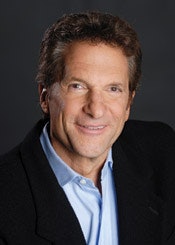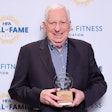
As the producer of more than 50 major motion pictures, Peter Guber knows something about storytelling. His best-selling 2011 book Tell to Win implores readers to "connect, persuade and triumph with the hidden power of story." In fact, Guber's diverse professional resume is a rich narrative all its own. He is chairman and CEO of the multimedia Mandalay Entertainment Group, having held those titles at Sony Pictures Entertainment and Polygram Entertainment. He served as president of Columbia Pictures and cofounded Casablanca Record & FilmWorks. Films he helped bring to the screen include five Academy Award Best Picture nominees and one winner - 1988's Rainman. He has for decades invested heavily in professional sports, owning minor league baseball, basketball and hockey franchises and operating their venues. In March, he became co-owner (with Magic Johnson and others) of the Los Angeles Dodgers, and he has co-owned the Golden State Warriors since 2010. Guber will deliver the keynote address Nov. 29 at the 2012 Athletic Business Conference & Expo in New Orleans, and he recently took time to provide Paul Steinbach with a preview.
Q: What is the power of story?
A: Information hits the mind; story hits the heart. We're all wired that way. Forty-thousand years of oral narrative is the way we passed along the tradition of our different cultures, religions and belief systems, because there was no printed word until a couple hundred years ago. There really wasn't mass publication. You had to pass along the information, and how do you do that? You imbed it in a Trojan horse - the story. The narrative gives it an emotional resonance. It bonds with the information and makes the information memorable, resonant and - most important - actionable. Whether you're in sports, politics or the military, you'll find it is the not-so-secret sauce of how we organize society and how we get individuals and people as a collective to do anything. It's unbelievably powerful.
Q: At what point did you decide to tell the story of storytelling?
A: I realized that at the end of the day, all of this digital technology, of which I was a big proponent, was cold comfort unless it was about the oohs and aahs, not the o's and ones. So I began to see that if I could help decode that premise and turn it into a promise, it would be useful.
Q: Who are - or were - the business world's best storytellers?
A: Jack Welch, former GE chairman. Steve Jobs, an unbelievable storyteller in electronics. Kevin Plank, who owns Under Armour. He calls himself the chief storyteller of his company. The point is, the best and the brightest are always using it - sometimes knowingly, sometimes less knowingly, always intuitively to some extent.
Q: What about the sports world?
A: I like Bill Simmons, who wrote The Book of Basketball. I think he's really clever and a great narrator. He's got a great voice and a great sense of intent and attention to both detail and the purpose of his narrative. I think Pat Riley is an incredible storyteller - having been a player, a coach, an owner, a team president. I think Magic Johnson is a great storyteller.
Q: Will you have New Orleans-themed stories to share when you speak at ABC?
A: Interestingly enough, I've made movies in New Orleans. Louisiana is a big movie area because they show you the money, meaning you have great subsidies and good locations and good crews. But you have to be very careful when you cast the actors to go to New Orleans, because the lure of that city - the food and the drinking and the activity and the carousing - can cost you. You have to have a line in your budget that says "excess." When you send actors to New Mexico, the worst that can happen is they get stung by a nettle.
Q: What does a movie producer actually do?
A: Well, I couldn't explain it to my mom too well, so I said, "Hollywood operates by the Golden Rule: He who has the gold, makes the rule." In Hollywood, the producer deals with the gold - the gold of financing the picture, the gold of finding the property, the gold of controlling the distribution and the asset itself, and the gold of collecting the money. Some have a more creative role; some have a less creative role. But it's not like the writer, who's easily defined; or the director, who's easily defined; or the actor. There are many facets to producers.
Q: Do you tend to the creative side?
A: Yeah, I was the person who was involved creatively, always. That was my voice. But as I became more successful, I took on other aspects of producing - raising the money and being involved with the marketing and distribution. It's an omnibus role that's defined differently by different people. Some people just put some money up and try to get a credit on the picture, so they can dine out on the credit, so to speak. But, you know, I cast no aspersions. It's part of the enterprise.
Q: Do you have input on the look of a film?
A: When I put my money and reputation on the line, I try to have a point of view on everything. But major filmmaking is a collaborative enterprise. The director has the creative vision for the project and executes it. Producers are a good balance wheel to help keep it on budget and keep it as a single vision, rather than a collaborative vision. It's a collaborative execution of a single vision. The producer has an important role in that.
Q: Do you have a favorite movie?
A: The favorite movie I worked on was Gorillas in the Mist - being in Rwanda, dealing with those animals at 10,000 feet, shooting a real feature film. That was an incredible film to work on. My favorite movies - I didn't work on them - are The Godfather and Being There. I love those movies.
Q: Are you able to attend many Dodger games?
A: I get to most all of the games here and some of them on the road, but I'm completely involved with the business of the Dodgers - supporting intellectually, reputationally, informationally, strategically.
Q: When you say reputationally, have you done anything to manage the perception - in the wake of last year's Bryan Stow beating - that Dodger Stadium can be a dangerous place?
A: When you have 56,000 people coming to you 80 or 90 times a year from April to October, in a big city, you have to manage all kinds of influences, not the least of which are security and comfort and family values. So that's a principle aspect of anybody running that kind of business, and you have to be involved with it.
Q: When are the Golden State Warriors moving to San Francisco?
A: We're working on it now. It's a big project - a number of years ahead of us. We're aiming for 2017, and we're well under way in the planning and organization. It's a long effort with a lot of people who have to approve it, and we hope and intend to be successful.
Q: There have been calls to change the name of the team, but it sounds like management is against that, correct?
A: In this world we live in today, everything is in a constant state of beta - from fan experience to players to location. Change is pervasive. So, at this point, with all the things we're doing, we believe the Golden State Warriors name is the name of the team, and for the foreseeable future it will remain that. But I can't tell you what will happen five, 10, 25 years down the road. I can't tell you what will happen, what the nature of the business will be three or four years from now, because change is so rapid. And I don't know how long I'll be around.
Q: Can you foresee an NFL team returning to Los Angeles?
A: I really couldn't answer that. I'm not in that business. I'm shooting a picture in Vancouver starting next month with Daniel Radcliffe, based on a hit book called Horns. I have all I can do to handle what I'm doing.





































